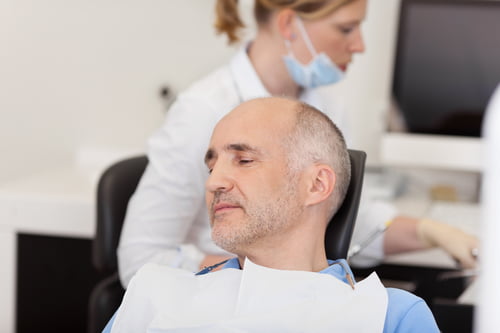
Sleep Dentistry: Is It The Right Choice For You?
 Sleep dentistry helps people to overcome their fears during dental treatments. Patients are mostly worried about the discomfort, pain, and vulnerability they might experience during the dental procedures. For them, sleep dentistry is the right choice.
Sleep dentistry helps people to overcome their fears during dental treatments. Patients are mostly worried about the discomfort, pain, and vulnerability they might experience during the dental procedures. For them, sleep dentistry is the right choice.
What is sleep dentistry?
Sleep dentistry helps patients to relax during dental procedures by using sedative medication. It is also known as ‘sedation dentistry’, in which, different levels of sedation such as minimal, moderate, and deep sedation are used. The extreme level is general anesthesia, which is the only type of sedation used to make the patients completely unconscious before the treatment is administered.
The standard sleep dentistry methods are as follows:
Inhaling Nitrous Oxide
In this sedation dentistry, the patient inhales minimal sedation medication containing nitrous oxide, also known as laughing gas, through a mask. This helps you to relax during dental procedures. As the intensity of this sedation is marginal, it is the only type of sedation, in which you can drive yourself home after the treatment, as it tends to wear off quickly. Your dentist has the control on the amount of nitrous oxide you inhale.
Taking Oral Sedatives
The intake of oral sedation could vary from minimal to moderate, depending on the dose given by your dentist. Usually, the patient takes a pill, which could be Diazepam, Halcion, or Valium prescribed by the dentist an hour before the treatment. Oral sedatives might make you feel a little drowsy. Dentists can increase the dose for moderate sedation. In this, the patient may fall asleep during the treatment but can wake up with a gentle shake.
IV Sedation
The IV sedative and intravenous dosages administered can put you in different levels of consciousness. Moderate or deep sedation in IV Sedation is lighter than general anesthesia. The latter puts you in a deep sleep.
Why people need sleep dentistry
There are various reasons due to which a patient prefers sleep dentistry, such as:
- History of bad experience with a dentist
- Psychological or physical resistance to dental treatments
- Anxiety and impulsiveness
- Discomfort due to local anesthesia
- Extreme sensitivity
- Soreness during medical procedures
If you find yourself fitting in any of the situation above, it is recommended to consult your dentist about sleep dentistry. The various types of dental treatments, such as dental implantation, root canals, tooth extractions, etc. can easily be done with the use of dental sedation.
Sedation dentistry does not apply to regular dental checkups, such as X-rays, cleaning, and other routine dental care procedures.
Is Sleep Dentistry The Right Choice?
General anesthesia is not always the best form of sedation dentistry. It is important to know what your dental treatment and procedure will include. If you are only worried about experiencing pain during the procedure, discuss local anesthetics with your dentist. It is administered using a short needle along the gum line to numb your mouth. Knowing your options will help you in making an informed decision, before your procedure.